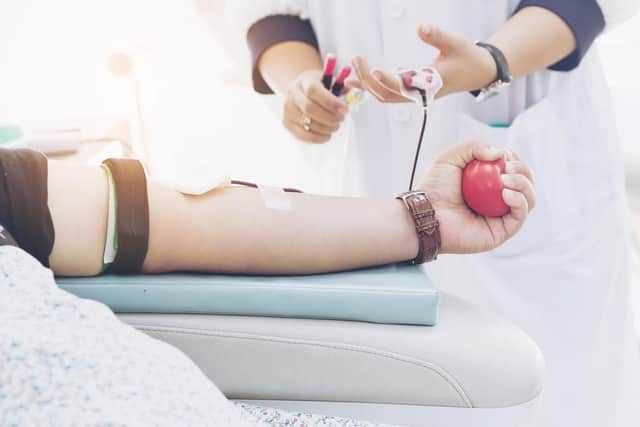More gay and bisexual men able to donate blood after new rule change comes into place
This article contains affiliate links. We may earn a small commission on items purchased through this article, but that does not affect our editorial judgement.
and live on Freeview channel 276
New rules have now come into place which mean more gay and bisexual men will be allowed to donate blood, platelets and plasma.
The new eligibility rules came into effect on World Blood Donor Day on Monday (14 June) and mean that donors in England, Scotland and Wales will no longer be asked if they are a man who has had sex with another man, NHS Blood and Transplant said.
Advertisement
Hide AdAdvertisement
Hide AdWe want to hear from you: let us know what you think about this story and be part of the debate in our comments section below


At a glance: 5 key points
-The changes to the donor safety check form will affect blood, plasma and platelet donors but the process of giving blood will not change
- Eligibility will be based on individual circumstances surrounding health, travel and sexual behaviours shown to be at a higher risk of sexual infection
- Any individual who attends to give blood regardless of gender will be asked if they have had sex and, if so, about recent sexual behaviours
Advertisement
Hide AdAdvertisement
Hide Ad- Anyone who has had the same sexual partner for the last three months will be eligible to donate, meaning more gay and bisexual men will be able to donate blood, platelets and plasma
- The changes follow a review into individualised criteria by the FAIR (For the Assessment of Individualised Risk) steering group led by NHS Blood and Transplant
What’s been said
“Patient safety is at the heart of everything we do.
“This change is about switching around how we assess the risk of exposure to a sexual infection, so it is more tailored to the individual.
“We screen all donations for evidence of significant infections, which goes hand-in-hand with donor selection to maintain the safety of blood sent to hospitals.
Advertisement
Hide AdAdvertisement
Hide Ad“All donors will now be asked about sexual behaviours which might have increased their risk of infection, particularly recently acquired infections. This means some donors might not be eligible on the day but may be in the future.”
Ella Poppitt, chief nurse for blood donation at NHS Blood and Transplant
“We welcome today’s historic change, which will help ensure more gay and bi men can donate blood and represents an important step towards a donation selection policy entirely based on an individualised assessment of risk.
“We want to see a blood donation system that allows the greatest number of people to donate safely and we will continue to work with Government to build on this progress and ensure that more people, including LGBT+ people, can donate blood safely in the future.”
Advertisement
Hide AdAdvertisement
Hide AdRobbie de Santos, director of communications and external affairs for Stonewall
Background
Under the new changes, people can donate if they have had the same sexual partner for the last three months, or if they have a new sexual partner with whom they have not had anal sex and there is no known recent exposure to a sexually transmitted infection (STI) or recent use of pre-exposure prophylaxis (PrEP) or post-exposure prophylaxis (PEP).
Anyone who has had anal sex with a new partner or with multiple partners in the last three months will be not be able to give blood but may be eligible in the future, NHS Blood and Transplant said.
The changes were welcomed by charities including the National Aids Trust, Stonewall and Terrence Higgins Trust.
Advertisement
Hide AdAdvertisement
Hide AdTo become a blood donor, register and book an appointment by calling 0300 123 2323, downloading the GiveBloodNHS app, or visiting the website.
A message from the editor:
Thank you for reading. NationalWorld is a new national news brand, produced by a team of journalists, editors, video producers and designers who live and work across the UK. Find out more about who’s who in the team, and our editorial values. We want to start a community among our readers, so please follow us on Facebook, Twitter and Instagram, and keep the conversation going.
Comment Guidelines
National World encourages reader discussion on our stories. User feedback, insights and back-and-forth exchanges add a rich layer of context to reporting. Please review our Community Guidelines before commenting.
